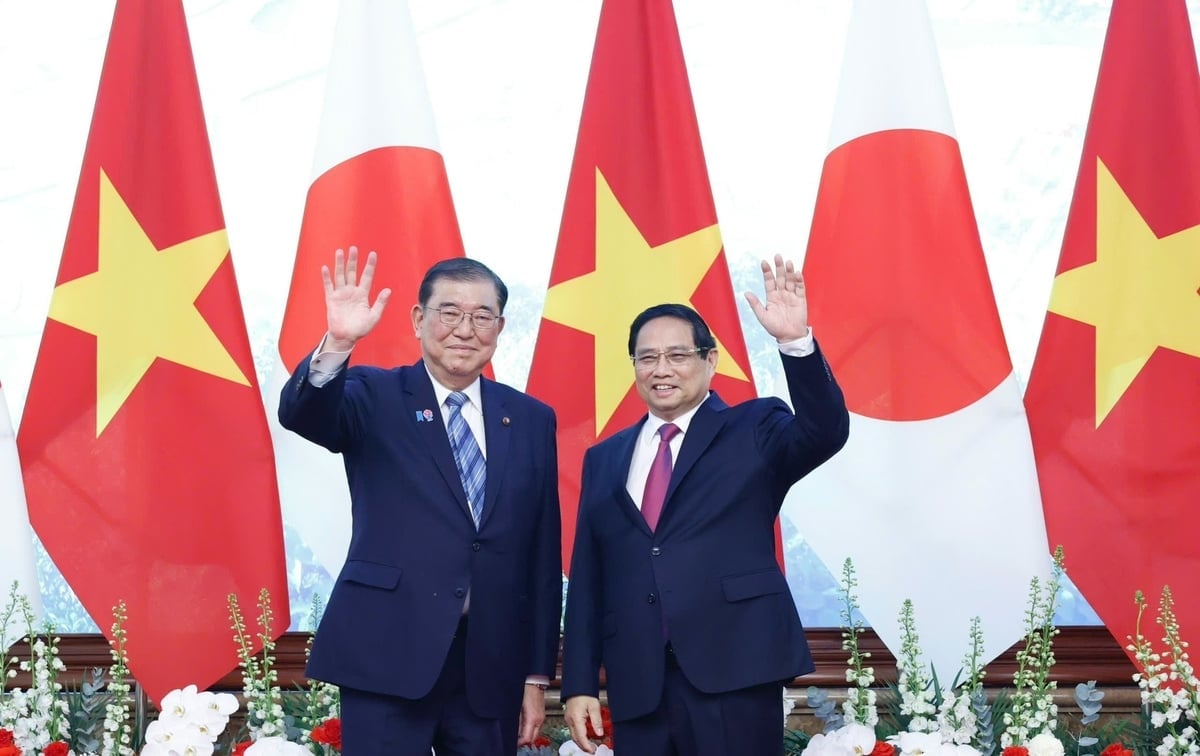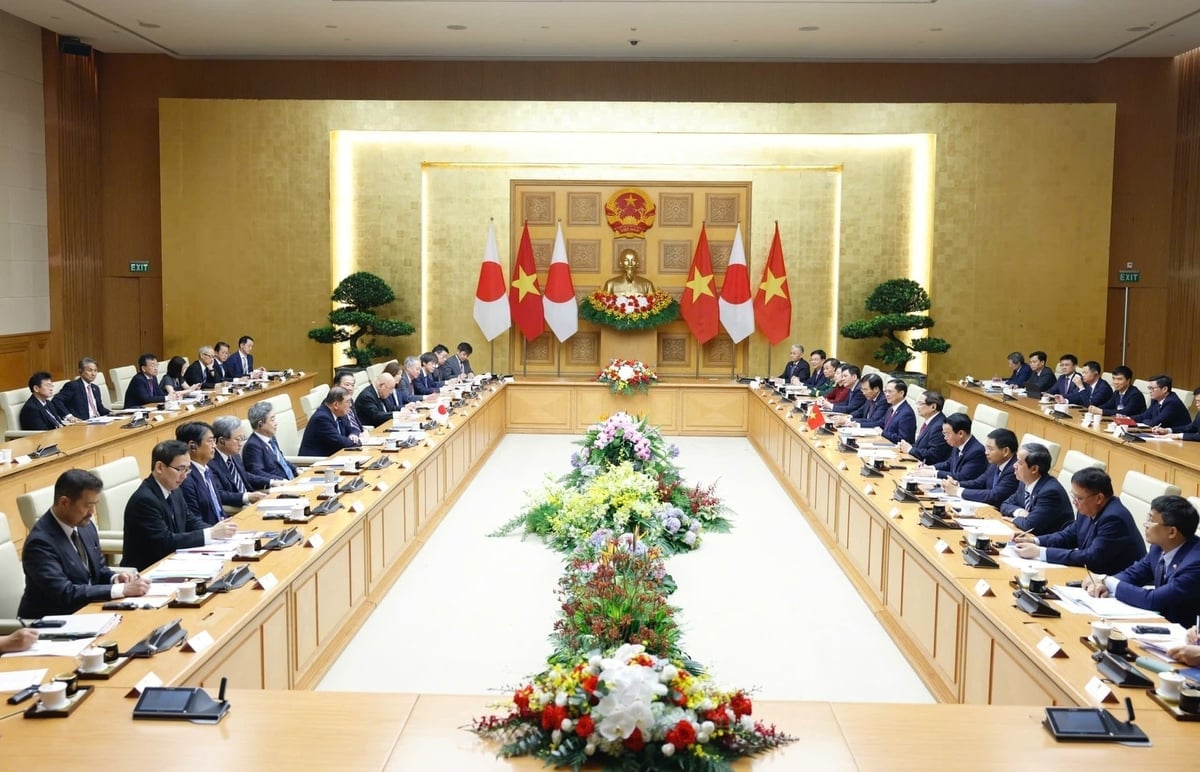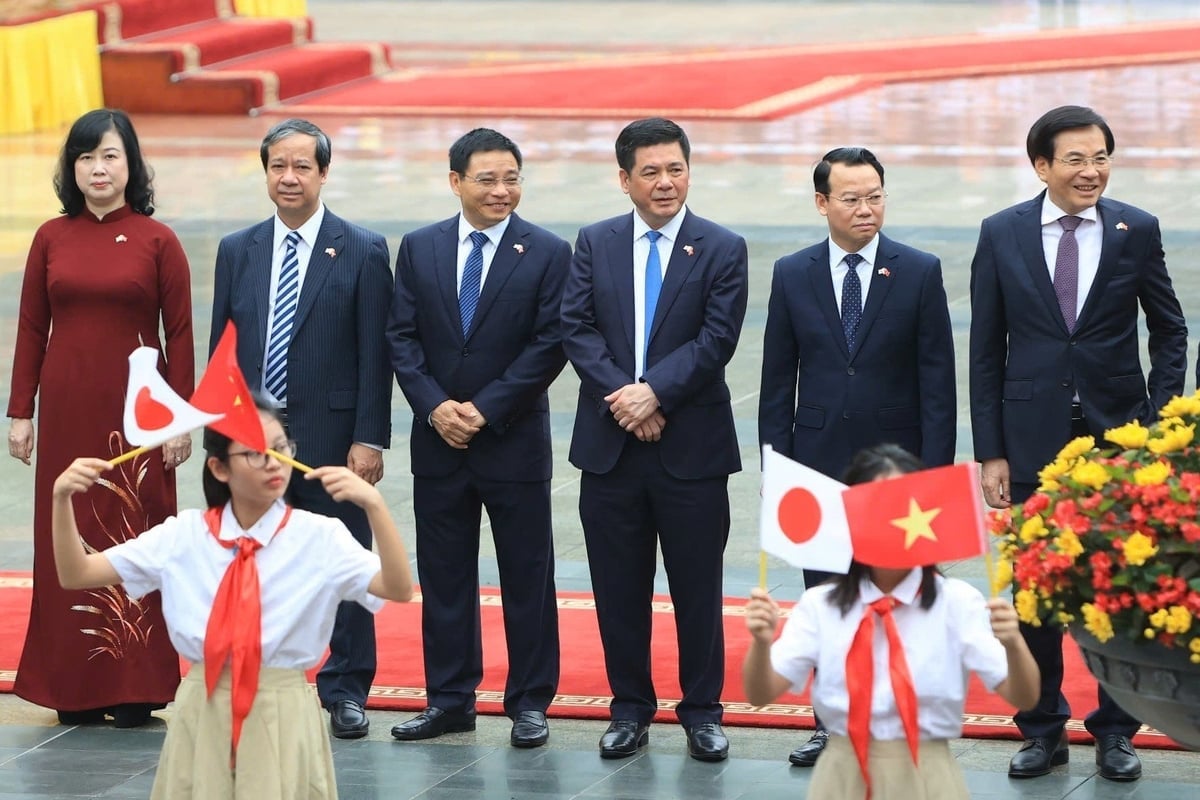January 1, 2026 | 13:39 GMT +7
January 1, 2026 | 13:39 GMT +7
Hotline: 0913.378.918
January 1, 2026 | 13:39 GMT +7
Hotline: 0913.378.918

Vietnamese PM Pham Minh Chinh and Japanese PM Ishiba Shigeru agree to sign mid and long-term vision on agri cooperation Photo: Nhu Y.
Prime Minister of Vietnam Pham Minh Chinh confirmed that Japan is one of the most trusted and significant partners. He underscored the substantial opportunity for bilateral cooperation, which is based on long-standing political trust, people-to-people exchanges, and complementary strengths.
PM Chinh expressed his gratitude and appreciation for Japan's contributions to Vietnam's socioeconomic development through ODA loans and private investment in the past years. He also shared Vietnam's strategic solutions within the Four Pillars that aim to achieve industrialization and modernization. The solutions to these issues include the establishment of an independent and autonomous economy that is closely integrated into the global economy, the implementation of streamlined administrative reforms, private-sector growth, and advances in scientific and technological development.
Prime Minister Ishiba expressed his great appreciation for Vietnam's regional and international position and influence. He reaffirmed Japan's commitment to supporting Vietnam's transition to a new era by assisting in its socioeconomic development, economic independence, industrialization, transformation, and advancement in science and technology.
In light of the current challenging global economic environment, both leaders agreed to strengthen economic cooperation as a central pillar of the bilateral relationship, intensify substantial and sustainable economic linkages, and mutually promote development.
The parties agreed to revitalize next-generation ODA cooperation for strategic infrastructure projects, aiming to enhance practical, effective, and sustainable trade and investment partnerships. They agreed to expedite and set specific timelines for several symbolic bilateral projects, including the Vietnam-Japan University, Cho Ray Hospital Campus II, and projects under the Vietnam National Space Centre, following recognition of significant progress on key projects such as Ho Chi Minh City's Metro Line No. 1.

At the talks, the two sides agreed to sign the Medium and Long-Term Vision on Agricultural Cooperation for the 2025-2030 period in 2025. Photo: Nhu Y.
A Medium and Long-term Vision for Agricultural Cooperation (2025-2030) will be signed by the leaders by 2025, and they also agreed to enhance cooperation in high-tech agriculture to ensure food supply chains.
In an effort to facilitate the sustained success of Japanese investors in Vietnam, Prime Minister Pham Minh Chinh has reaffirmed Vietnam's commitment to enhancing the business and investment environment.
Considering the similarities in development strategies based on scientific technology and digital transformation, the two Prime Ministers have identified cooperation in science and technology, innovation, and high-quality human resource development as new pillars of bilateral relations. They agreed to increase cooperation in fields like semiconductors, quantum technology, nuclear energy, information technology, artificial intelligence, the green transition, and energy transformation. By conducting the fifth session of the Joint Committee on Science and Technology Cooperation in 2026 and investigating the development of novel public-private partnership mechanisms in scientific and technological collaboration, both parties have pledged to enhance the efficiency of current science-technology cooperation frameworks.
The Vietnamese PM requested that Japan continue to assist Vietnam in the areas of developing high-quality human resources, fostering cooperation between research and training institutions, scientists, and businesses from both countries, and increasing scholarships for Vietnamese students and researchers. Additionally, he requested Japan's assistance in establishing a community of 70 businesses and 5,000 Vietnamese IT engineers to participate in Japan's digital transformation process actively and IT supply chain.

Government members attended the official welcoming ceremony for the Japanese Prime Minister on the morning of April 28. Photo: Duc Thanh.
Through the Japan–ASEAN Science, Technology, and Innovation Cooperation Project (NEXUS), Prime Minister Ishiba confirmed Japan's commitment to providing Vietnam with collaborative research projects and doctoral training in semiconductor technology. In addition, he disclosed Japan's intention to execute 15 energy transition projects valued at more than 20 billion USD within the Asia Energy Transition Initiative (AETI) and the Asia Zero Emission Community (AZEC).
Both PMs agreed to enhance cooperation in responding to natural disasters, addressing climate change, and fostering human resource connections through labour cooperation, local partnerships, cultural exchanges, and people-to-people interactions. They will actively coordinate the Vietnam-Japan Local Forum, which is scheduled to take place in Vietnam by the end of 2025. Their goal is to stimulate cooperation and the exchange of experiences in promoting tourism and traditional cultural exchanges.
To facilitate the Vietnamese community in Japan, the two parties have agreed to initiate negotiations on the Vietnam-Japan Social Security Agreement in 2025 and promote the establishment of a Memorandum of Understanding for a new labor program, known as "Jobs for Skill Development."
The contributions were greatly appreciated by PM Ishiba, who also reaffirmed his commitment to the Vietnamese community in Japan, which amounts to over 600,000 individuals. Japan and Vietnam have mutually agreed to continue discussions on simplifying procedures and broadening the scope of entry visas issued to Vietnamese citizens. The objective is to achieve a total of 2 million annual tourist visits.
Regarding regional and international issues, the two PMs agreed to maintain close cooperation in global and regional forums, such as the United Nations, ASEAN, and the Mekong. Adhering to the fundamental principles of international law and the United Nations Charter, they emphasized the importance of maintaining an international order and a free, open, inclusive, and rules-based trading system.
The importance of maintaining peace and stability, as well as resolving disputes in the East Sea (also known as the South China Sea) through peaceful means, was reaffirmed by both leaders. They emphasized the timely establishment of a substantive and practical Code of Conduct in the East Sea (COC), which should be based on international law, particularly the 1982 United Nations Convention on the Law of the Sea (UNCLOS) and the Declaration on the Conduct of Parties in the East Sea (DOC).
Translated by Linh Linh

(VAN) Located in three former provinces, Nam Dinh, Thai Binh, and Ninh Binh, and now in two provinces, Ninh Binh and Hung Yen, "Red River Delta" is the name of Vietnam's first interprovincial coastal wetland World Biosphere Reserve.
/2025/12/29/1046-1-210728_624.jpg)
(VAN) In 2025, Viet Nam recorded severe and extreme disasters, breaking multiple historical records and causing heavy losses in lives, property, and infrastructure nationwide.

(VAN) Applied technologies, water-saving irrigation is a strategic solution to promote climate-resilient agriculture and strengthen water security in the uplands.
/2025/12/29/3936-3-163422_251.jpg)
(VAN) Can Gio mangrove forest in particular and the entire Can Gio Mangrove Biosphere Reserve in general hold great potential for carbon credits.

(VAN) Chu Pah Rubber has announced its products that comply with the EU Deforestation Regulation (EUDR), affirming its commitment to sustainable production and product origin transparency.

(VAN) Deputy Director Nguyen Hoai Nam stated that a digital data platform will be developed with agricultural sector databases, utilizing AI to help farmers make informed decisions on 'watering correctly, sufficiently, and efficiently.’
/2025/12/29/4841-2-134224_777.jpg)
(VAN) From only about 10 individuals in 2009, the wild elephant population in Dong Nai has recovered to nearly 30 animals after more than 10 years.